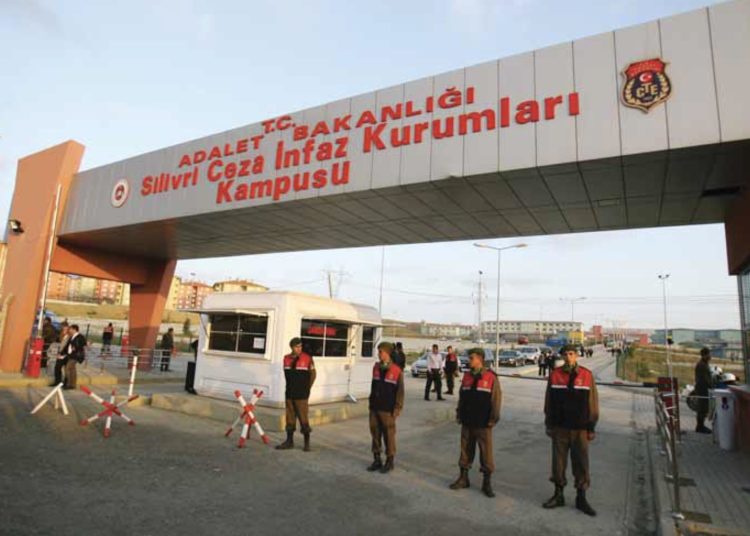In a clear violation of Turkish law and the case law of the European Court of Human Rights (ECtHR), political detainees in Turkish prisons were denied the right to vote in local elections held on March 31, 2019.
The family members of people who are unlawfully jailed as part of a massive crackdown on critical groups in Turkey told Nordic Monitor that prison authorities rejected the request of detainees who wanted to cast their votes in local elections. In a prison in Mersin province, authorities allowed only one person in each cell block to go to the polling station to participate in the elections. Sources spoke on condition of anonymity for reasons of safety.
In another prison none of the detainees were allowed to cast a vote, and authorities balked at inmates’ requests to go to the polling station, saying that detainees can file their grievances with whomever or whatever authority they like but that the result would be the same.
The Turkish constitution says that “citizens have the right to vote, to be elected and to engage in political activities independently or in a political party, and to take part in a referendum.” It allows detainees in penal institutions to vote while excluding convicts in prisons except those convicted of acting without malicious intent.
As a result the prison administration must make accommodations for inmates in pre-trial detention and not yet convicted to cast their votes.
Section 7 of the Law on Basic Provisions Concerning Elections and on Voter Registers states that convicts in penitentiaries cannot vote.
The ECtHR ruled in 2013 that the blanket denial of voting rights to convicts may infringe on Article 3 of Protocol No. 1 of the European Convention on Human Rights, which deals with the right to free elections. In a ruling in the case of Turkish businessman Ahmet Atahür Söyler, the court said the ban on convicted prisoners’ voting rights was “harsher and more far-reaching than any the Court has had to consider in previous cases.”
Söyler was convicted in 2007 of writing checks without sufficient funds in his bank account and was sentenced to nearly five years in prison. He was also unable to vote in the general election of 2011 even though he had been released on probation.
The ECtHR decided that the Turkish constitution and the law on prisoners’ voting rights were too harsh as they failed to take into account the nature of the offense and were also indiscriminate.
According to Article 90 of the Turkish constitution, “International agreements duly put into effect bear the force of law. No appeal to the Constitutional Court shall be made with regard to these agreements, on the grounds that they are unconstitutional. In the case of a conflict between international agreements in the area of fundamental rights and freedoms duly put into effect and the domestic laws due to differences in provisions on the same matter, the provisions of international agreements shall prevail.”
In other words, the European Convention on Human Rights takes precedence over the Turkish constitution, and the court’s judgement is binding on Turkey, meaning that Turkey must resolve differences between the case law of the Strasbourg court and comply with the court’s judgments.
However, not only did Turkey not change the relevant article of the constitution and the law to allow convicted inmates to cast their votes in some cases, it went ahead and restricted even further the voting rights of detainees who were not yet convicted.
Turkey’s Supreme Board of Elections (YSK) ruled in December 2018 that inmates will be able to vote only if they are imprisoned in the district in which they were registered to vote before their incarceration. Since the inmates have no choice as to which prison they are assigned — which can be any prison across the country, according to authorities — the measure was seen as quite harsh.
Eight members of the YSK voted in favor, while three voted against. The main opposition Republican People’s Party (CHP) representative in the YSK, Mehmet Hadimi Yakupoğlu, said that for the first time in its history, the YSK had restricted voting rights despite its contravention of Article 67 of the constitution.

The Turkish government exerts undue influence over the election commission, and in an unprecedented move the term in office of some of the members was recently extended by the government.

In 1995 the constitution was amended to exclude prisoners in pre-trial detentionfrom the scope of the restriction because disenfranchising a person detained in prison pending the outcome of the criminal proceedings against them was considered incompatible with the principle of presumption of innocence. In the 2001 amendment, persons convicted of committing offenses with a lack of malicious intent were excluded from the restrictions on voting.
The government of President Recep Tayyip Erdoğan has been rolling back the improvements made to the rights of detainees and convicts in Turkey, further restricting their right to vote. In practice, even those who are allowed to cast their votes under the new restrictions put in place by the election commission were unable to vote because the prison authorities refused to allow it.
According to a state-run Anadolu news agency report on March 10, 2019, Turkish Interior Minister Süleyman Soylu said 511,000 people had been detained since a 2016 failed coup as part of a crackdown on the Gülen movement, a civic group that is critical of the Erdoğan government. They were considered to be political prisoners.












